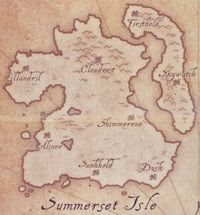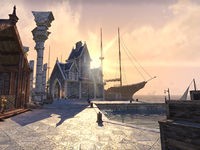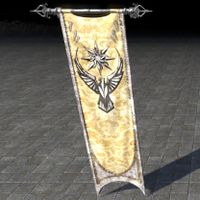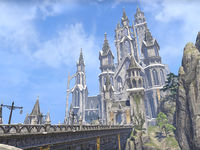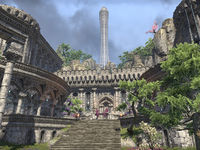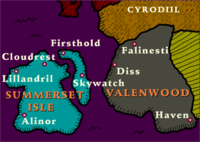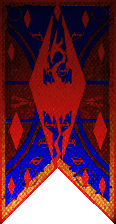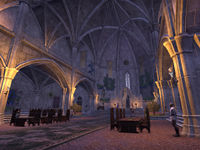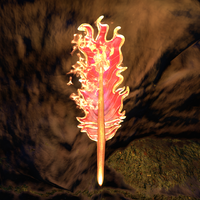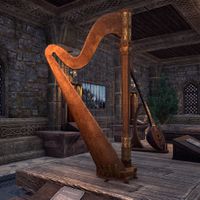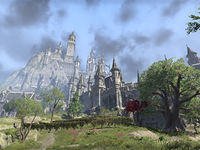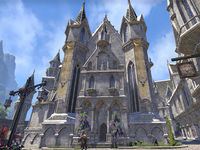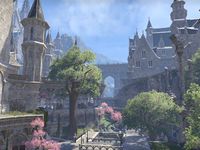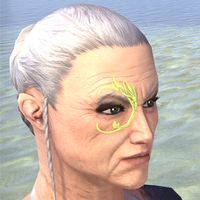Lore:Alinor (city)
| Alinor | |
|---|---|
| Type | Settlement |
| Continent | Tamriel |
| Province | Summerset Isles |
| Region | Summerset Isle (Oleander Coast) |
| Demonym(s) | Alinoran,[1] Alinori,[2] Alinorian[3] |
| Appears in | Arena, ESO |
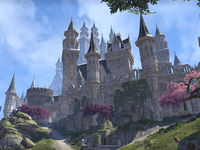
|
Alinor is one of the eight major cities in the province of the Summerset Isles,[4] found on the river highlands of the Oleander Coast. Alinor is the ancient capital of the Summerset Isles and the seat of High Elven civilization. It is widely recognized by its sky-piercing towers and intricately woven ramparts that are designed to catch the light of the sun to break it into a variety of colors.[5] For thousands of years, it has been the home of the High Kingship of Summerset, who sits at the highest point of the city and surveys across their grand domain.[6] The city is the namesake of the province's modern-day name, chosen by the Thalmor as they assumed power over the country.[7]
Contents
Layout and Geography[edit]
Alinor is a city of great prestige, known commonly as the "forest city of Summerset".[8] It is located in the temperate southwest coast of Summerset Isle, between the southern mountains and the idyllic beaches. Much of the land that surrounds it is lightly forested but steep and ridged. There are rows of vineyards found outside of the city walls and a great river runs through Alinor's southern portion and empties into the Sea of Pearls.[9]
Alinor is built on the slopes of the mountains. The lowest level of the city is the main street, which goes along the wall and toward the river. Stairways ascend higher toward the second level where the marketplace and even the Temple of the Divines are located. Reaching higher and higher will eventually lead to the Alinor Royal Palace, where the whole city can be surveyed from a wide vantage point.[9]
Despite the fact that the city is landlocked, the Alinor Docks are a bustling trading hub, located down the road north from the actual city, closer to the central bay of the island. Alinor is widely recognized for the impossibly high towers and ramparts. While information regarding the entire island is sparse for the mainland, most of it regarding High Elven culture and civilization comes from the human traders who were only given access to the Alinor Docks than anywhere else.[9] Some accounts of Alinor city described it eloquently as "made from glass and insect wings".[5] The southern city, Sunhold is considered Alinor's sister city, and it is believed that if these two metropolises did not have the mountains separating them, then they would inevitably merge together to form a great city, the likes of which have not been seen since Lost Aldmeris.[6] Alinor is neighbored by several settlements, including Marnor Keep to the southeast and Riverwatch to the northeast.[4]
Notable Locales[edit]
|
|
|
History[edit]
The Kingdom of Alinor and the Summerset Isles[edit]
For many known years, there has been a city called Alinor and from there, the High King of Summerset had always ruled the province. It is said that the High Kingship of Alinor has always been held by a single dynasty that has dated back to the Merethic Era.[11] By the mid-Mythic Era, the Heartlands of what is now modern-day Cyrodiil was apparently tribute-land to the High King of Alinor. It later became the new home of the proto-Ayleids and the epicenter of their vast empire.[12]
When Veloth communed with Boethiah in the rainbow shadows of the Crystal Tower, he wrote the Velothi Prophecies and garnered followers among Aldmer clans, creating a schism. That schism was outright prohibited by the Alinoran Sapiarchs but Veloth's followers persisted onward and eventually left the Summerset Isles for a new home.[13]
For the longest time, history regarding Alinor or even the Summerset Isles was unclear to the rest of Tamriel since contact from anything on the mainland was heavily restricted. The world-changing events that transpired in Tamriel had barely, if not at all affected the Isles and any little bit of information came from human traders only relegated to the Alinor Docks, or the ambassadors of the Second Empire, who were given access to Alinor at large.[5]
One of the only known exceptions to this rule was Alinor's involvement in the All Flags Navy. The fleet's construction was centralized in their harborage in the Systres but places such as Alinor and Rivenspire contributed greatly to the navy's assembly throughout the 1E 2240s.[14] Excluding large-scale events that involved the mainland, much of Summerset's history has been generalized as internal conflicts between rival cities that later evolved into full-scale warfare. Alinor and Lillandril, in particular, had conflicted throughout the years,[15] like in the Alinor-Lillandril skirmishes in 2E 230.[16]
Some of the province's more serious and deadly battles involved either the Maormer or the Sload.[15] One such example occurred in 2E 486 when High King Hidellith confronted a small Maormeri fleet off the coast of Alinor. As the fleet retreated, the High King followed suit and came upon uncharted waters not far from the island-kingdom, Pyandonea. There his army was caught in an ambush and only one ship carrying Hidellith was able to escape the onslaught.[17] The High King's survival had miraculously kept the royal family alive for much longer.
The Unforeseen Queen and the Aldmeri Dominion[edit]
It eventually came time for Hidellith to conceive a child that would become the heir-apparent of Summerset. Under auspicious and inexplicable circumstances, the quick-witted and unorthodox Ayrenn was born on the 5th of Second Seed in 2E 555. In her youth, she was a prodigy and eager to learn, often taking to her own independent studies. As it is custom for every monarch, in 2E 573, Ayrenn was to be inducted into the Sapiarchs' Labyrinth to study Altmeri Regal Praxis and Ceremoniarchy for three-thousand five-hundred and fifty-five days. She disappeared not long after and not even the Thalmor were able to find her in all of Summerset. Time kept on moving and in her stead, Prince Naemon studied in the Sapiarchs' Labyrinth as Ayrenn explored the world and witnessed what it had to offer. When Hidellith passed away in 2E 580, Ayrenn returned home and claimed her birthright as the High Queen of Summerset.[18]
In that same year, she provided support against the Colovian incursion that harassed Valenwood's northern region[19] and sent waves of assistance to Elsweyr after their run-in with the Knahaten Flu.[20] Once these issues were dealt with, the leaders of these three respective nations, Queen Ayrenn, High King Aeradan Camoran, and the Speaker of the Mane, Gharesh-ri signed the Elden Accord and formed the first-iteration of the Aldmeri Dominion.[21] The Dominion had soon joined the Three Banners War that had raged continuously throughout central Cyrodiil and later established their grand capital in Elden Root. Ayrenn was forced to leave Alinor for the mainland, where she can properly maintain focus on the war effort and in her stead, her cousin, Alwinarwe sat on the Throne of Alinor and was named Proxy-Queen of Summerset.[22]
The End of Isolation and the Court of Bedlam[edit]
In 2E 582, Queen Ayrenn had officially proclaimed that Summerset Isle will no longer seal itself off and now open itself to the rest of the world.[23] It brought a great deal of controversy among the people of the province, but regardless, mainlanders came in droves and established themselves across the island. One of its greatest critics was the Kinlady of Shimmerene, Avinisse, who saw Ayrenn's decision as a comprise of Summerset's civilized climate, much like her other choices throughout her two-year reign.[24]
Various people from all corners of Tamriel traveled to the capital city and explored the grand streets. Even delegations from far away, such as the Eastern Kingdom of Skyrim came to Alinor to seek an audience with the Proxy-Queen.[25] But despite all of this, devious machinations had begun to spur across Summerset and put the entire continent at a great risk.[26]
The Court of Bedlam had undergone operations across the Summerset Isles and became entangled with the group of Sea Sload called the Abyssal Cabal. The Psijic Order came into Summerset to investigate the island and warn the College of Sapiarchs about the court's target, the Crystal Tower. They sent a newcomer to the Alinor Royal Palace to seek out the Proxy-Queen's permission to enter the college.[27]
Eventually, the Daedric Prince of Darkness, Nocturnal had seized control of the Heart of Transparent Law, taking the Daedra Lord one more step closer to claiming the Crystal Tower. To prepare for what may happen, the Eyes of the Queen, Razum-dar traveled to Alinor, in the hopes to warn the Proxy-Queen and prepare the city for whatever came their way.[28] In the end, Nocturnal and her champion were quashed and Tamriel was saved from their plan. But in order to prevent such an event from happening again, the Psijic Order, the College of Sapiarchs, and the Court of Alinor gathered at the Royal Palace, to proclaim an alliance that would defend the Crystal Tower at all costs.[29]
Alinor and the Third Empire[edit]
As time kept going, the First Aldmeri Dominion had dissolved and the relations between the Summerset Isles and the mainland had reverted. Alinor had continued to remain open for many years, that was until roughly 2E 814 when its ports were closed for any foreigners. By 2E 830, the heirs of the Camoran Dynasty in Valenwood began fighting over the throne. When a certain faction made peace with their Colovian neighbors their numbers increased greatly and brought the throne in their favor.[5]
That was until the Summerset Isles, under the command of their High King of Alinor, invaded the forest province. Using ancient stewardship written thousands of years prior, they placed the Thalmor into Valenwood, on behalf of their own claimant, Camoran Anaxemes. With their new King, the Wood Elves joined forces with the High Elves to create the Second Aldmeri Dominion. Their power became immeasurable and soon interfered with the growing Third Empire under the command of Tiber Septim. The Tiber War began to take a southern front as it expanded.[5]
By 2E 864, the warfront had reached the Blue Divide and the Topal Bay. The Empire had sent the Grand Vizier and Septim's advisor, Zurin Arctus to conduct negotiations with the High King of Alinor.[5] By then, the Aldmeri Dominion was far from Tiber Septim's mind for conquest. It was at this time, that he had conquered Hammerfell and later had the land recognized as an Imperial Province, only to soon shift focus toward the northeast. By the end of it, Tiber Septim had received Numidium, the Brass-God of the Dwemer and used its righteous power to end the Aldmeri Dominion. The imposing automaton had stomped its way through the Dominion and eventually the Summerset Isles,[30] arriving not far from Alinor. The city was demolished and it surrendered within an hour.[UOL 1] Tiber Septim's conquest over all of Tamriel had come to an end by 2E 896, paving the way for the Third Era.[31]
In 3E 110, the kings of the Summerset Isles formed a unified alliance to combat the Maormer[31] in their last-known invasion of the province, the War of the Isle.[2] Despite having assistance from Emperor Antiochus and the Imperial Navy, the Maormer were defeated because of a supernatural storm conjured accredited to the Psijic Order.[31][32]
During the Imperial Simulacrum in the late-Third Era, the city-state of Alinor was an active settlement. It was ruled by King Coreriil and had a rivalry with Lillandril.[8] The Summerset Isles were left in ruins after the Oblivion Crisis in 3E 433. Amidst the confusion, the Thalmor rose to prominence across the province as the rest of the Empire was standing on thin ice. The situation exploded further in 4E 10 when the Potentate, Ocato of Firsthold was assassinated and the Stormcrown Interregnum had spanned across the central province. In light of this, the Thalmor had overthrown the monarchy of Summerset in 4E 22. The High Kingship had fallen and the Thalmor's law was accepted widely across the isles.[33] They renamed the country to "Alinor", to callback to a time before man took over.[7]
Known Rulers[edit]
Since as far as the Merethic Era, the Throne of Alinor has been occupied by a single royal bloodline, up to at least Queen Ayrenn.[11] Their symbol depicts the Aldmeri Eagle, which also represents Auri-El, the chief divine of the elves and the First Aldmeri Dominion.[34][35] The Court of Alinor (also called the High Court of Alinor)[36] is the council that serves the monarch.[5][18] When a new monarch inherits the throne, they must travel to Tanzelwil, vast ruins on Auridon to commune with the dead and seek their approval to the throne.[37]
The royal heirs of Alinor travel north to the College of Sapiarch to study in the Sapiarchs' Labyrinth before they can become the High King or Queen. They have to study Altmeri Regal Praxis and Ceremoniarchy for three thousand five hundred and fifty-five days before they are crowned.[38]
For the longest time, the Psijic Order served as counselors to the rulers of the Summerset Isles. If anyone wanted their counsel, their best method was either through a select few places or the kings themselves. They continued this service up until their island of Artaeum first vanished in the Second Era, around when the Mages Guild was formed. When they returned several years later for the Third Era, they continued where they left off[39] until Artaeum disappeared a second time sometime in the Fourth Era for whatever reason.[40]
- The Merethic Era
- Unnamed High King of Alinor (ca. Middle Merethic Era)[12]
- The First Era
- Unnamed High King of Alinor (ca. Middle Dawn)[41]
- The Second Era
- King Tamlien — When Ayrenn traveled to Tanzelwil, she hoped the dead would recognize her as Tamlien's heir.[37] A contemporary figure named Marieve was an oracle who predicted Tamlien's death.[42]
- King Hidellith (fl. 2E 486 – 2E 580)[17][18]
- Queen Ayrenn (2E 580 – 2E ?)[18]
- Unnamed King of Alinor (fl. 2E 830 – 2E 864)[5]
- The Third Era
- The Fourth Era — Once the Thalmor came into power, they abolished the monarchy across the Summerset Isles.[33]
Culture and Society[edit]
Since time immemorial, master harp players would play an Aldmeri harp called Lilytongue for the High Court of Alinor. Some of the most well-known performances from this harp were from the great composer, Rolmelval but the harp was eventually lost during the War of the Uvichil,[36] which took place between 1E 2911 and 1E 2917.[15] It later re-surfaced in Skyrim, where it was put on display in the Bards College.[36]
The Alinor Allemande is an ancient dance that is noted for its painstaking notations.[43] The Grand Masquerade of Alinor is an event that only takes place every one-hundred and fifty years.[44] The Alinor Eye Crest, an accessory that was originally given to those who serviced the Summerset nobility saw wider use in the Alinor-Lillandril skirmishes of the Second Era. Alinor warriors wore it to identify themselves from their enemy.[16]
Alinor is the setting of a fictional book written by Waughin Jarth called Feyfolken. It revolved around the mute Alinoran scribe, Thaurbad Hulzik, who lived the life of a hermit and wrote for the Temple of Auri-El bulletin board. When the Mages Guild had first arrived in Alinor, he sent his messenger to have his quill enchanted. The quill was enchanted with a daedric spirit named Feyfolken and it wrote the most illuminating pieces of literature and art last seen since Gallael. Thaurbad relished in the praise and admiration from viewers of the bulletin board but over time, realized he had nothing to do with the writing and only bore witness to whatever the quill itself wrote.[45] Thaurbad tried many times to get rid of the quill but over time, became deranged from Feyfolken's constant changes and threats to his life. Eventually, the scribe died in a fire and the quill moved to its next wielder.[46]
The Sun Birds of Alinor was an organization of Aldmeri explorers from the Merethic Era.[47] They were among the few people to attempt exploration beyond Nirn and into Aetherius. Just like the explorers of the Reman Dynasty, the faction dissolved at the same time because the amount of magicka required for this feat was extraordinary.[48] They were, however, able to pierce the veil between Mundus and Aetherius with raw magic from the Ehlnofey.[47] Under the Third Empire, Alinor was a major port in the East Empire Company's southwest line. It is connected to the cities, Dusk, Senchal, and Stros M'Kai.[49] Delicate midnight ink is a mainstay in proper Alinor calligraphy.[50]
Gallery[edit]
Notes[edit]
- According to the God of Worms, Mannimarco, the Dragon Break of the Middle Dawn was caused by the High King of Alinor.[41]
- Arena was originally conceived as a fighting game featuring a tournament that took the player to each of Tamriel's cities to challenge different gladiatorial teams. According to a file from that stage of development left behind in the final game, Alinor's gladiatorial team would have been called "the Protectors".[UOL 2]
See Also[edit]
- For game-specific information, see the Arena and Elder Scrolls Online
 articles.
articles. - Alinor-style Architecture and Furnishings
Books[edit]
- Lilytongue — Notes on an ancient Aldmeri harp
- The Star-Eyed Bride of Alinor — A poem of lost love upon stormy seas
References[edit]
- ^ Razum-dar's Journal, Chapter 5 — Razum-dar
- ^ a b Pocket Guide to the Empire, 3rd Edition: Other Lands — Imperial Geographical Society, 3E 432
- ^ Farewell Note to Lauriel — Selenwe
- ^ a b Map of the Summurset Isle – The Elder Scrolls: Arena
- ^ a b c d e f g h Pocket Guide to the Empire, 1st Edition: Aldmeri Dominion — Imperial Geographical Society, 2E 864
- ^ a b Our Blessed Isles: A Guide — Runilstir the Surveyor
- ^ a b The Great War — Legate Justianus Quintius
- ^ a b c Alinor location and rumors in Arena
- ^ a b c d e f g h i j k l Alinor in ESO: Summerset
- ^ The Dragon Break Re-Examined — Fal Droon
- ^ a b Alinor Royal Palace loading screen in ESO: Summerset
- ^ a b Before the Ages of Man — Aicantar of Shimerene
- ^ Daedra Worship: The Chimer — Phrastus of Elinhir
- ^ Systres History: Volume 3 — Trilam Heladren, Associate Dean of Eltheric History, University of Gwylim
- ^ a b c Pocket Guide to the Empire, 3rd Edition: The Blessed Isle: Alinor and the Summersets — Imperial Geographical Society, 3E 432
- ^ a b Alinor Eye Crest major adornment description in ESO
- ^ a b The Maormer of Pyandonea — Imperial Geographical Society
- ^ a b c d Ayrenn: The Unforeseen Queen — Headmaster Tanion of the College of Aldmeri Propriety
- ^ Ask Us Anything: Aldmeri Dominion (Part 1) — The Elder Scrolls Online Website
- ^ The Eagle and the Cat — Lord Gharesh-ri, Speaker for the Mane
- ^ Queen Ayrenn's dialogue in ESO
- ^ a b Meet the Character - Proxy Queen Alwinarwe — Ayrenn
- ^ An End to Isolation — Queen Ayrenn
- ^ A Rejection of Open Borders — Kinlady Avinisse of Shimmerene
- ^ Culture Clash quest in ESO: Summerset
- ^ Valsirenn's dialogue in ESO: Summerset
- ^ The Tower Sentinels story quest in ESO: Summerset
- ^ A Necessary Alliance story quest in ESO: Summerset
- ^ A New Alliance story quest in ESO: Summerset
- ^ The Arcturian Heresy — The Underking, Ysmir Kingmaker
- ^ a b c Brief History of the Empire v 1 — Stronach k'Thojj III
- ^ The Wolf Queen, v5 — Waughin Jarth
- ^ a b c Rising Threat, Vol. IV — Lathenil of Sunhold
- ^ Regal Eagle Wing Face Tattoo head markings description in ESO
- ^ Driftwood Idol treasure text in ESO
- ^ a b c Lilytongue
- ^ a b Queen Ayrenn's dialogue in ESO
- ^ On the College of Sapiarchs — Adandora, Chronicler at Large
- ^ Fragment: On Artaeum — Taurce il-Anselma, 3E 400
- ^ Tolfdir's dialogue in Skyrim
- ^ a b Where Were You ... Dragon Broke — Various
- ^ Vanus Galerion's dialogue in ESO
- ^ Alinor Allemande antiquity codex entry in ESO: Greymoor
- ^ Royal Masquerade Invititation contraband text in ESO: Summerset
- ^ Feyfolken II — Waughin Jarth
- ^ Feyfolken III — Waughin Jarth
- ^ a b Prismatic Sunbird Feather antiquity codex entries in ESO: Greymoor
- ^ Pocket Guide to the Empire, 3rd Edition: Arena Supermundus: The Tapestry of Heaven — Imperial Geographical Society, 3E 432
- ^ Map of the East Empire Company – The Elder Scrolls V: Skyrim
- ^ Tamrielic Calligraphy, Chapter VII — Alanya of Alinor
Note: The following references are considered to be unofficial sources. They are included to round off this article and may not be authoritative or conclusive.
